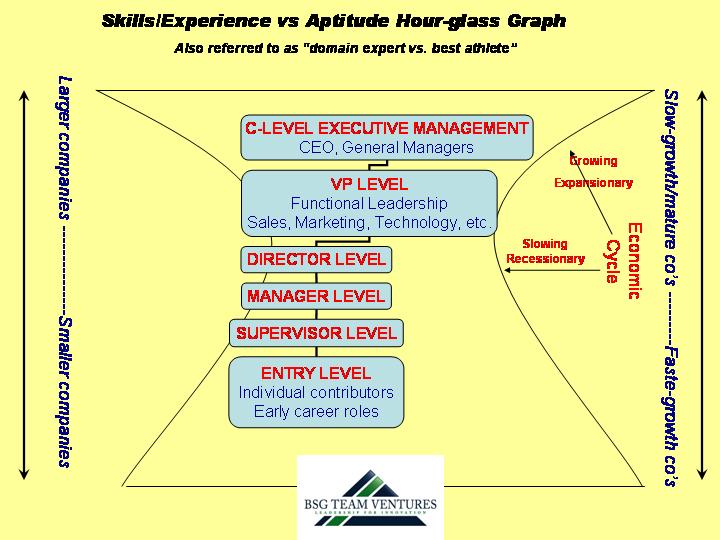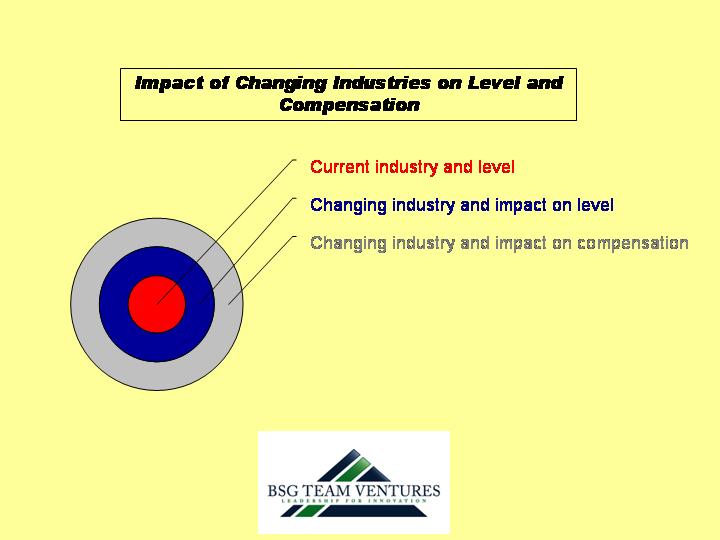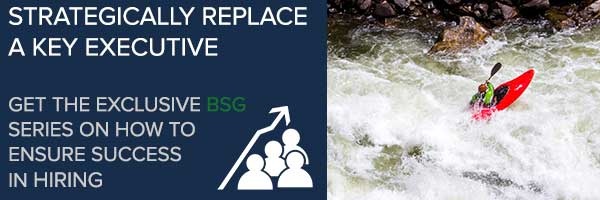
One of the questions we as executive recruiters often get asked is the trade-off between experience and aptitude. Both sides of the equation are prone to asking it, clients and executive candidates alike. Sometimes this teeter-totter is referred to as "domain expert versus best athlete."
What do they mean when they ask? There's actually a lot of nuance in the question-when are skills and experience most important to success in the role versus pure talent and aptitude?
- Just because a CEO is moving from one industry to another, does s/he lose his ability to successfully lead?
- If a VP Sales has been successful at one stage of company growth, can s/he take that same sales toolbox and be successful in another stage company, say either emerging-stage or mature-stage?
- Can a VP Engineering be equally effective managing in large companies and small?
- Do companies look for the same types of leadership in good economic cycles as well as bad?
- How does an executive's move out of their wheelhouse of skills and experience impact their compensation and/or level in a new industry and company?
These questions are only a few of the factors that impact the answer. The following discussion is aimed at trying to lend some clarity and context to question.
Let's take a look at the hour-glass graph below to lay down some of these factors against our "expert or athlete" question:

1) Level of management: The first factor is where an employee sits in the organizational chart. In general, skills and experience are most critical at the "waist" of the hour-glass graph-mid-to-upper level management, starting at manager, through director- and VP-level. At the top and bottom of the hour-glass, aptitude often ends up as the greater emphasis in "hireability." This may be fairly intuitive for many.
a. Entry-level: When you first get out of school, employers often hire for a combination of attitude and intelligence and look for those who exhibit room to grow or "headroom." In fact, at entry-level, skills and experience for those roles are often a liability. Employers may feel someone is overqualified, or a "flight risk" if that employee finds another better-paying and/or higher level position at another company.
b. CEO-level: When you achieve P&L/CEO status, employers often will place more emphasis on the track record a CEO has in leading a company versus a tenured career history in a specific industry area. Can a CEO move from rust-belt manufacturer to biotech? Likely not. However, there isn't the same granularity of fit applied at the CEO-level as at the middle-management layer. If a CEO has been broadly successful in in a number of software companies, it often becomes less important what type of software, or what industry vertical that software was developed for. Certainly some screening is applied to industry, with some of the below more general industry characteristics takingi precedence-
i. Experience in selling to similar customer base, B2B vs. B2C or government
ii. Experience raising equity capital from venture capital or private equity
iii. Experience creating exits for investors that have generated good returns for those investors
iv. Experience taking a company from one industry into other industries, popularly referred to as "crossing the chasm"
c. Mid-to-upper management: Mid and upper management are where skills and experience over mere aptitude are often most sought after by employers. Those who are hiring at this level will often even emphasize industry skills and experience above managerial experience, giving the edge to a candidate with industry-relevant background and a lesser degree of leadership experience, assuming that management is a learned skill and can be taught or picked up on the job. Is this right? That's not the focus of our discussion here. Rather, our goal here is to describe corporate hiring norms from our observations.
2) Stage of company: Does stage of company impact whether you hire a best athlete or domain expert? Common practice dictates that yes, the later stage more mature company can be successful hiring a "best athlete," where a faster-growth company needs to hire a candidate with more domain experience relevant to that industry. Why? The theory goes like this-
a. Fast-growth companies: The faster a company is moving and growing, the less time there is to cross-train an employee on anythng. This applies to all candidate characteristics: level of industry knowledge, stage of company experience, and management experience. In fact, if a fast growth company needs a VP, if anything that company may want to over-hire, looking for an executive who has managed larger teams over broader geography because it's only a matter of time before this fast-growth company will experience its next growth spurt, and hiring an executive who's seen what's around that corner before is priceless in order to smooth out the growing pains inherent to all fast-paced companies.
b. Slowing-growth companies: As a company matures, hiring in a "best athlete" may make a lot of sense. First, there is time to train up the executive being hired on the domain areas in which he or she has little/no experience-industry, geography, etc. Also, best-athlete executives often like to learn new things, and be in continual learning-mode. If they can take their business athletic ability and learn a new sport/industry, it keeps them motivated, excited, fresh, and leaning into the role rather than what can be called "career-coasting," where an executive is just doing the same thing for a different company-same industry, same title, same goals, etc.
3) Large versus small companies: Similar to fast-growth versus mature companies above, common wisdom dictates that large companies can support the "best athlete" better. Often, large companies have an established internal employee training group tasked with taking new and existing employees and helping to round them out, whether that be by offering management or leadership training, functional skills education, or industry knowledge and education. Smaller companies rarely have this pre-existing infrastructure. Yes, an executive can go outside the company for supplemental business education by taking courses offered by industry trade groups and universities. However, the fear by the employer is that it will take time, cost precious budget resources, and detract from the time an employee has to give to achieving critical company goals and objectives.
4) Impact on hiring of macro-economic cycles: It's worth noting that the prevailing economic cycle creates another impact on whether a company may be willing to consider a best athlete versus a domain expert. From our experience, in a growing economy companies are more willing to consider best athletes for the following two reasons:
a. Supply/demand of domain experts-In a flourishing economy, demand for talent often outstrips supply. We saw this in the Internet bubble where talent available was so scarse that it became a serious constraint on new company formation and venture creation.
b. Cost of domain experts-as a growing economy impacts the supply-demand equation, this also drives up price. Even if you can find the domain expert, it may simply be considered too expensive, and the company instead decides to take a "wean-and-train" approach to filling the need, favoring the hire of a best athlete.
***
Related to the question of experience versus aptitude is how this may impact executive compensation and management level for the employee considering a change out of their area of domain expertise and into the new.
Below is a bull's-eye diagram that represents what we believe to be the inverse relationship in play. When an executive decides to change any of the following characteristics in their employer, they are likely to move out at least one ring:
- Impact of size of company on title/level: If an executive wants to move from a smaller company to a larger company and they were a VP at the smaller, they should expect that they will move out a managerial ring, from VP in a smaller company to a director-level or even manger-level title.
- Impact of industry shift on compensation: If an executive wants to move from one industry to another (say software and/or tech to cleantech / renewable energy), often this will have to come at the expense of a reduction in compensation. Of course, if this is a CEO candidate, compensation may be less impacted than if it's a middle management employee.
- Impact of functional shift on compensation: If an executive wants to move from sales to marketing, or technology development to sales, or any of those to an operations-focused role, this too is likely to negatively impact compensation.
If you try to combine more than one shift above into two or more, expect that with each compounding factor you're likely to move out another ring on the bull's-eye.

Having difficulty focusing your executive search? Leverage our expertise for optimal results.





